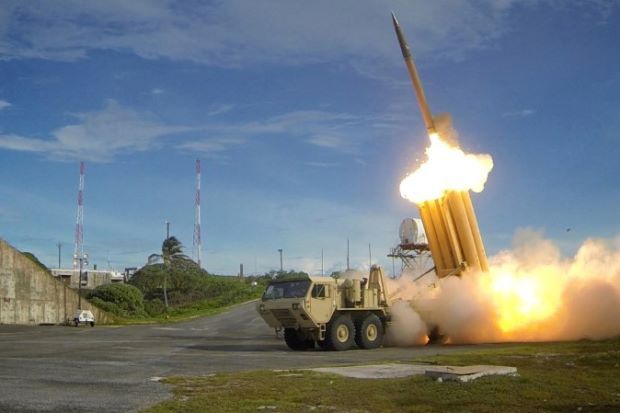The deepening controversy over the now suspended deployment of an advanced US missile defense system in South Korea will likely be one of the major issues to be discussed between their leaders when they meet in Washington later this month, experts said Sunday.
South Korean President Moon Jae-in is to meet with his US counterpart Donald Trump on Thursday and Friday (local time) in their first face-to-face talk since they both took office.
 |
(Yonhap) |
The summit takes place amid growing worries that the controversy and seemingly increasing cacophony between the allies over the deployment of the Terminal High Altitude Area Defense system on South Korean soil.
Ever since its installment decision was announced in July last year to better defend against North Korea's threats, it has mostly caused friction with China worrying that it could compromise its missile and military capabilities.
Beijing has taken what appears to be retaliation against South Korean businesses ever since.
The THAAD issue, however, seems to have morphed into something causing an unexpected divide between South Korea and the US when Trump earlier caused a stir here by calling on Seoul to pay for THAAD, estimated at $1 billion.
Adding to this controversy, President Moon called for due installation process for THAAD, and ordered a special investigation into what was seen as a secret or undisclosed THAAD installation process.
Moon was quoted as saying that he was "shocked" not to be reported on deployment of four more rocket launchers in addition to two already in place. The whole installation has been suspended pending the survey, which could take months, if not years.
The suspension sparked speculation that it might be a first step toward eventually reversing the THAAD installation decision. Moon has repeatedly denied it, saying that there will be no turning back.
In a recent interview with Reuters, however, Moon seemed to have upped the ante ahead of the summit, apparently taking issue with the overall installation process underway before he took office. He noted the deployment had "mysteriously" accelerated.
Washington seems to be uneasy about the ongoing controversy over THAAD.
The displeasure was evident when US Sen. Dick Durbin said in an interview with Yonhap News Agency late last month that the US could use the money needed to operate the missile defense system "some other place" if Seoul doesn't want it.
His remarks were interpreted here as a thinly veiled threat to withdraw the THAAD system, a decision that could turn into a political and diplomatic burden for the Moon government.
In an apparent attempt to temper the situation, US Secretary of State Rex Tillerson told his South Korean counterpart Kang Kyung-wha in their phone conversation last week that he "respects" the diplomatic process underway in Seoul with regard to the THAAD deployment.
Against this intensifying row and back and forth between the allies, experts say that it seems to be inevitable that THAAD will be one of the major agenda items for the upcoming summit.
They argue that what the South Korea head has to do is to clear up any uncertainties hanging over THAAD and work hard to prevent it from turning into a stumbling block in other areas, including North Korea's nuclear threats.
"It seems inevitable that THAAD will be a major issue that Moon and Trump will discuss during their talks," Woo Jung-yeop, a researcher at the Sejong Institute, said.
"The government has said that there will be no reversal in its deployment decision. Having said that, what South Korea has to do is to dispel any uncertainties or concerns in Washington and try to manage things well so as not to let the THAAD issue hamper its efforts on other fronts including North Korea and its nuclear problem," he added.
Park Won-gon, a political science professor at Handong Global University, echoed the view, saying that it is necessary for Moon to make it clear "again" that there will be no withdrawal for THAAD when he meets with Trump.
"Our leader still needs to frankly say that the reason why Seoul is taking a cautious approach toward THAAD is because of China and that pressure China is exerting on us could become a burden, while seeking coordination to jointly resolve all of this," he added. (Yonhap)








![[Today’s K-pop] Blackpink’s Jennie, Lisa invited to Coachella as solo acts](http://res.heraldm.com/phpwas/restmb_idxmake.php?idx=644&simg=/content/image/2024/11/21/20241121050099_0.jpg)